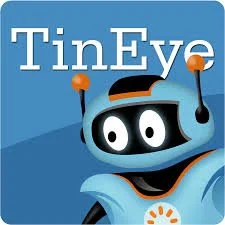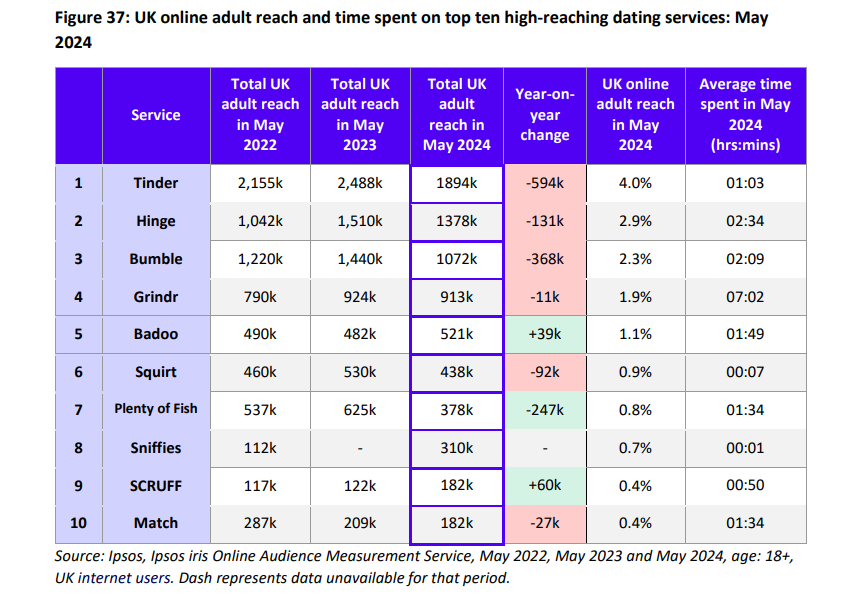
CAAGe Focus
The Role of Dating Sites in Grooming
The stats are in…..
Ofcom (2024): 10% of online UK adults visited an online dating site or app.
Statista (2023/2024): 11.1 million online dating users in the UK in 2023, which was over 16% of the total population.
YouGov (2025): Around 10% of Brits have met their partner on an app.
The Guardian (2024): Just under 5 million adults visited a dating service in May 2024
Dating sites are big business. However, reports show user numbers on dating sites in decline. Statista calculates that the average dating site user still spends £247.
Statista (2023) 61 percent of online dating service users in the United Kingdom were men, 39 percent were women.
What sites are people using?
Dating Site Usage, Ofcom (extract)….
Groomed for Money
“In a romance scam, the victim is persuaded to make a payment to a person they have met, often online through social media or dating websites and with whom they believe they are in a relationship. Fraudsters will use fake profiles to target their victims to start a relationship, which they will try to develop over a longer period. Once they have established their victim’s trust, the criminal will then claim to be experiencing a problem, such as an issue with a visa, health issues or flight tickets and ask for money to help.” (UK Finance)
TSB’s research (2021) suggested that a 35% of frauds began on Facebook, including Facebook Dating, 24% on Tinder, 21% on Plenty of Fish and 9% on Match.com. This data shows which sites people were scammed on (but doesn’t reveal to us what percentage of frauds in total actually begin on dating sites or how those fraud numbers compare to actual site usage.)
So we looked for something a little more recent, and Action Fraud has just released it’s fraud statistics (Sept 2025). At least £106 million was lost to romance fraud last year, about 9% of total UKFraud - so a significant amount. UK Finance tracked £35 millon, and reported falling numbers of ‘romance scams’ - 17% less thanks to wider awareness:
• Romance scams have an average of nearly 11 scam payments per case - the target is often convinced to make multiple, generally smaller, payments to the scammer
• Reimbursement rate in 2024 was 64 per cent (up from 37 per cent in 2020)
• 75 per cent of all romance scams originated online in 2024 - at odds with our own research data which showed a trend offline. We feel we should defer to these stats, as they have a greater insight into actual losses, and our data relates only to people who KNOW they’ve been groomed.
Advanced fee scams are on the rise: the criminal persuades their target to pay a fee in order to the release a much larger payment, or as a deposit for high-value goods or holidays. Typical scams might include winning an overseas lottery, gold or jewellery being held at customs, or an inheritance imminent. The fee must, allegedly, be paid to release the funds/goods, which will never materialise.
Romance fraud is on the increase!
When Good Dates Go Bad
In 2022, a team of researchers at Brigham Young University found that attacks on people who had met through dating apps happened faster and were more violent than when the perpetrator met the victim other ways. And perpetrators who use dating apps select vulnerable people as their targets.
So whilst our data hasn’t shown grooming via data sites to be vastly different to the outside World, grooming is just one part of the picture and it’s important to stay safe.
Reporting issues
Internet users have had mixed outcomes from their reporting, according to Ofcom. Our experience has been that dating sites aren’t great at policing their environment, although this has had to improve. The ODDA has clear guidelines on lots of things, including:
Services should define acceptable behaviour guidelines for users through Terms and Conditions and/or Community Guidelines.
Encourage users to report abuse and provide easily accessible tools to block unwanted interactions.
Filter tools for contact control and responsive handling of reports.
These are great in as far as they go, but there are no clear actions to be taken if abuse is found - it is left to the user to report, when the site will have far more data on an individual’s interactions. There are no required actions if a member is abusive - even local pubs have ‘banned from one, banned from all’ policies for bad behaviour. And the ODDA is not a statutory body, it’s a membership organisation.
According to Ofcom stats on the Internet in general:
over half of those who reported or complained about potentially harmful content or behaviour online said that nothing had yet happened as a result of taking action (53%). Our experience talking to victims is that this trend applies to online dating sites.
Almost a fifth said that the content had been removed (18%). We - backed by research - don’t believe that users are generally removed from dating sites following complaints, and have seen nothing to suggest anything like a ‘three strikes’ rule. (False reporters, by contrast, will find themselves prosecuted.)
Satisfaction levels with the reporting or complaints process varied for UK internet users, with 32% feeling satisfied with their experience and 36% feeling dissatisfied. We are instinctively certain that the disasfaction levels would be higher than this for dating apps.
In a 2020 survey of 4,860 dating app users in the US, over half of the women reported unwanted sexually explicit messages or images from another user, and 19% of female users (aged 18–34) stated they were threatened with physical harm through a dating app.
With declining numbers of people using dating platforms and apps - and dreadful Trustpilot scores all round indicating huge dissatisfaction- surely they should be upping their game:
insisting that user identities (name and age) are verified;
screening users for sexual offenders;
making sure that all users have clear reminders of basic behaviour requirements each time they log in (language, respect, safety)
reports acted on quickly and efficiently, and affected users advised;
stronger controls over data sharing of profiles between sites with explicit permission required; and easier sharing of abuse reports between sites;
barred from one, barred from all,
computer monitoring of conversations on the app, with investigations handled where flagged;
a complete ban on AI profiles.
And if they can’t, it would be fair to ask for a regulator to be created - one empowered to keep people safe.
Who’s at the other end of my conversation?
-

Signs of Romance Scammers
Even though this article is created by a bank, it contains some really good generic advice, including spotting the signs of roamce scammers.
-

How to spot a fake profile
Love Said have produced a great guide on spotting fake profiles for Romance Fraud Awareness Week.
It covers some of the ‘Red Flags’ to look for on datings sites
-

How to spot an AI image
This article from Kellog Insight is a great summary of the ways to spot an AI image:
- the hands
- things floating
-disappearing items
- text
- perfection!
It’s safe to say, however, that these are being worked on as we read!
-

Is it Ok to check up on the New Person You're Dating?
CAAGe Lead Counsellor Wendy Gregory takes a look at the balance between their rights to privacy and your rights to stay safe in this article in Cosmopolitan, Is it ok to check up on the new person you're dating?
The answer is, of course, yes.
But, like most things, it’s more nuanced.
-

Check out someone's identity: image
Dating sites usually have profile images.
These can be checked out very easily - if a picture can’t be downloaded a screen shot will do.
In due course we will find a way to make this easier to explain and demonstrate, but in the meantime, whilst there are many tools that will charge ypu for their usage, a Google image search is a good place to start.
Is this ethical?
Absolutely, although you must ensure that this doesn’t become stalking behaviour. It’s fine to check things out for safety.
Note that this is simply a basic check and the fact that someone’s picture doesn’t appear on a search is no guarantee of anything other than that Google can’t find it. It may well, however, flush out a catfish.
-

How to find a person online (free)
This great little article looks summarises the technology and the ethics of searching for someone online. to check them out
-

Checking out someones identity: their name
You’ve got far enough into conversation/relationship to know someone’s first name and surname.
It’s perfectly reasonable, given the amount of stories we hear about dating frauds, to check them out online using the name they’ve given you.
A basic Google search can reveal a lot, but other places to look include Facebook, LinkedIn and Instagram.
The fact that someone’s name and story match what you find online only indicate that just that - that the name and story match. ‘Fine upstanding members of the public’ can have a dark side.
Catfishers may steal someone’s identity to trap you.
But this is a great place to start - you’ll see if the pictures match, if they’re ‘in a relationship’, maybe even if they work where they say if they’re on a site like LinkedIn.
It feels a bit stalker-y, but it’s just due diligence - expect them to be smart and do the same to you. It is not a lack of trust - it’s information already in the public domain, and you both deserve peace of mind.
-

Tin Eye image search
TinEye in an alternative way to perform a ‘reverse image search’ (like the Google one shown here). This is useful for verifying that someone’s image is who they say they are.
You can uploadi an image, search by image URL, drag and drop a picture , or copy and paste to search for an image
-

Five ways to spot if an image is legit
The BBC has approached this article as a way to see if image based news is accurate, but the advice given here on seeing if an image is genuine is useful.
-

Private Investigators
We know that our own recommended Private Investigator will hate us for putting this picture up.
However, it’s there for a reason.
To be honest if you get to the stage of mistrust where a PI becomes necessary, it’s probably a red flag and time to walk away.
But sometimes we think it’s our own imaginations playing tricks. Or we simply need to understand the truth.
So we’re happy to have found someone we consider to be a great PI with a good track record and strong background.
-

What is catfishing?
CAAGe looks at what ´’Catfishing’ is as part of its ‘Lexicon of Abuse’ series.
Catfishing is a common tactic of groomers on dating sites, pretending to be someone else in order to trap their targets.
-

Clare's Law
Clares Law gives individuals the right to know whether their current partner or ex has a history of violence or abuse.
Staying Safe When Dating Online
-

Dating Safety Tip Sheet: Women Against Crime
Women against Crime has created a downloadable tip sheet
-

Solace Womens Aid Safety Plan
Description goes hereSolace Womens Aid are at the frontline when things go wrong. They report referrals which include rape, stalking, physical abuse and coercive control.
They have produced a safety plan to help people use sites safely
-

Government Safety tips for Dating Sites
Afer the CMA looked into dating sites sharing data without explicit permission from users, the CMA issues¡d advice for people using dating sites.
-

FBI advice regarding financial love scammers
The FBI (USA) has put together advice on staying safe on dating sites, with a warning to remain alert to scammers.
-

What is Breadcrumbing?
Breadcumbing is an emotional manipulation that groomers often use to establish emotional dominance over their targets.
CAAGe explains.
-

'Russian Brides'/Internet Brides
This article offers an overview of the Russian Brides type websites. Journalist Geoffrey Wansell looks at what happens.
The article is dated (2012) but most of what is in it is very current.
-

Romance Scams
Although produced by Avast, who want to sell you online safety software, this comprehensive article offers some solid advice.
This includes spotting the signs of scamming behaviour and the characteristics of fake dating profiles.
-

Is a site listed with the ODDA?
The ODDA (Online Dating and Discovery Association) is “on a mission to create a dating and social discovery world that’s safe, fair, and enjoyable for everyone.”
It’s principles seems good, but we currently have no insight into how efficient it is. they do not handle complaints or enquiries about services, so it’s hard to see how this benefits users.
However, organisations are vetted before joining.
Signing up would at least indicate a willingness to clean up the dating industry’s act, so we have noted in our Dating Sites Project where sites are members.
ODDA does not accept ‘Internet Brides’ sites.
-

What's 'Pig Butchering'?
A relatively new form of scamming, Pig Butchering has become more commonplace. It’s a tactic that gets people involved in afake relationship, whose real purpose isn’t love. It’s money. In the form of crypto currencies.
How to spot a catcfish online
Crypto romance scammers
Ten things romance scammers say
Grooming on dating sites
-

Do Adult Groomers Groom On or Offline
CAAGe took a deep dive into the data it’s collated into where adult groomers go to start their grooming.
And this, of course, made us take a deep look into dating sites….
-

TSB research into financial grooming
The TSB ran research shortly after lockdown into where frauds began.
Although many met on social media, dating sites had a big role to play.
-

Herrick v. Grindr
When Matthew Herrick’s ex boyfriend used Grindr to set up a false profile, many people were hurt in the process, being sent to meet him at his workplace amongst other places.
Grindr’s response is typical of dating sites - that they have no responsibility.
The link here will take you to the solicitors statement on the case, which Herrick didn’t win. Today he remains a campaigner for change.
-

Gay men targeted on dating site
This South African article, which shows how a gay man was targeted for a beating instead of a date on gay dating site, Romeo, is not atypical of some of the things that happen on online dating sites.
-

Fraudsters breaking hearts and emptying bank accounts
According to the Guardian, romance scams robbed Britons of nearly £100m last year. Thanks to online dating and the pandemic, these cruel crimes are more sophisticated and prevalent than ever.
-

Anna's story
Anna was catfished by an unscrupulous man, a lawyer, who used a fake image to mislead her regarding who he was.
-

David's story
David lost £15k as part of a £7 million on line dating con - fortunately Victim Support were able to offer some help: David’s story
-

Beware!! Action Fraud is NOT responsible for eHarmony Romance scams money reclaim
There is a site online calling itself the Action Fraud Claims Service. It has a specific area for eHarmony fraud.
The site is NOT an official part of Action Fraud OR of eHarmony.
We do not know how effective or otherwise this service is, And whether or not it’s a scam site.
But if you’ve already been a victim of one scam, being mislead into using a service presenting itself as something it’s not is not a great look for a company.
-

The size of the problem
The figures are old (2021), but when 40% of people looking for love online find themselves instead asked for money, there’s a warning to be had!
-

Romance Fraud is on the increase
The City of London police warn of the dangers of romance fraud, with more than £106 million lost in a year.
-

Insurance fraud on dating sites
The latest romance scam: targetting women on dating sites for insurance fraud
-

Men more likely to be groomed online
Our data, to October 2025, showed that 50% .of male respondents had been targetted online.
This falls to under 20% for women.
(Note that the sample size for men was a lot smaller, but the result is still significant.)
-

Spot the signs
Protecting Your Heart and Wallet: 7 Signs You’re Dating a Scammer.
Great information from Which?
Groomers on Dating sites
-

Nathan Atkins
Nathan Atkins was found guilty of orchestrating staged car crashes using women he met on dating sites.
-

Shimon Hayut/ Simon Leviev: 'The Tinder Swindler'
Shimon Hayut/ Simon Leviev was exposed in a documentary called ?the Tinder Swindler’, which is the true story of how he funds a champagne lifestyle by ripping off women he meets online, primarily on dating apps like Tinder.
-

Jason Lawrance
Jason Lawrance met the women through online dating site Match.com and through Dating Direct.
In 2016 he was imprisoned for life for raping five women, attempting to rape one woman, and sexually assaulting anothe between June 2011 and November 2014.
In July 2019 he was convicted of five more charges of rape, one charge of sexual assault and a further charge of assault by penetration.
-

Dr Stephen Matthews
Dr Stephen Matthews drugged and sexually abused at least 10 women he met on dating apps owned by the Match Group.
Fifteen women are known to have reported him. It is believed there are more.
Match Group’s Hinge website had failed to act on reports, according to various news outlets.
-

Aurora Phelps
Aurora Phelps met her targets on dating sites. She also used the names Aurora Flores, Aurora Velasco and Aurora Alvarez.
She would meet and incapacitate her targets, male and female alike, whilst she stole their cars, withdrew money from their bank accounts, used their credit cards to purchase luxury items and gold, and more.
Although she is believed to be in custody in Mexico currently, the FBi is seeking further information on further victims.
-

'King Con' Richard Robinson
A quick search on his real name, Richard Robinson, will demonstrate just how he used online dating sites to target women.
But with 30 aliases, and a specific tactic of targeting comfortably off rather than rich women, he was able to line his pocket at their expense.
-

James Scott/Gregg Wilson
Despite being married with three children, Gregg Wilson, AKA James Scott, used a dating site to meet Coleen. She was conned by the charmer, as was her sister - to the tune of £80 thousand.
-
New List Item
Description goes here
Where to report on dating sites
Sources of Support
-
Action Fraud is the place to report cyber crime and fraud: Action Fraud
-
There are a number of counsellors that CAAGe is very happy to recommend for their understanding of Grooming.
Find out more: CAAGe counsellors
-
Blogs and adice on catfishing: Catch the Catfish
-
A CAAGe project letting people know where to find dating sites’ ‘safeguarding’ measures, and where to report: The Dating Sites Project
The project is ongoing and information is being posted as it’s been researched.
-
CAAGe: How to find legal help
-
Not everyone will find the need to seek help for their mental health, but CAAGe research shows clearly the effects of grooming on people’s wellbeing.
But CAAGe has created a *still growing) resource to help you find help with your mental health: Sources of Mental Health Support
-
Rape Crisis England & Wales is a charity working to end sexual violence and abuse.
-
Report Harmful Content helps to report harmful content online by providing up to date information on community standards and direct links to the correct reporting facilities across multiple platforms
https://reportharmfulcontent.com
(Part of the Internet Watch Foundation)
-
-
-
Check your date out with a little professional help: Rogue Daters
-
The NHS maintains a list of SARCs (sexual assault referral centres). These are specialist medical and forensic services for anyone who has been raped or sexually assaulted: SARCs
-
As David’s story, above, demonstrates clearly, Victim Support can be a great source of help and support: Victim Support
-
DateID builds a screening profile of your date, based on available information on the web, offering people greater confidence that someone hasn’t uploaded fake photos or false details.
It also allows users to prove to others that their profile is genuine,
Which UK Laws and Bodies Cover Dating Sites
Please note that this is here as a guide and is not a replacement for proper legal advice.
-
The Victims’ Code focuses on victims' rights and sets out the minimum standard that organisations must provide to victims of crime.
-
ASA:
Advisories regarding dating sites.
-
The CMA’s involvement is offering advice to businesses and they have previously taken dating sites to task. This guide tells dating sites sites/apps agencies what’s expected of them - and therefore what users might reasonably expect
-
The National Crime Agency leads the UK’s fight to cut serious and organised crime, protecting the public by targeting and pursuing those criminals who pose the greatest risk to the UK.
-
The National Crime Agency Suspicious Activity Reports is for reporting suspicions of Money Laundering or Terrorist Financing (only): SARS Portal
-
Ofcom (The Office of Communication) is the main regulator for online safety, including aspects of dating apps, under the Online Safety Act.
Where to complain about online services, websites or apps: https://www.ofcom.org.uk/make-a-complaint/complain-about-a-video-sharing-platform-vsp
-
This Government summary will help you if you think information about you has been misused by a dating site, for example sharing it with sites you did’t expect to appear on:
-
Need to check out someone you met on a dating site?
The Domestic Violence Disclosure Scheme, known as Clare’s Law, allows individuals to ask the police whether their partner, or the partner of someone they know, has a record of violence or abuse.
The Right to Ask lets people apply for information directly
The Domestic Abuse Alliance have a useful guide to both the law and to applying for information.
https://domestic-abuse.co.uk/blog-clares-law-request-information
-
This summary in the House of Commons Library was probably the least complex we could find:
-
Intimate Image Abuse Laws came into effect in January 2024 in England and Wales: Intimate Image Abuse
-
Can you help?
We are looking for a volunteer to help us
research dating sites’ public profiles to find their safeguarding policies and who to contact with concerns
where this isn’t available, to contact contact the dating sites to ascertain what someone should do if they meet someone who grooms or otherwise abuses people they meet.




